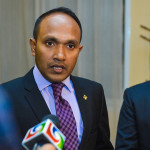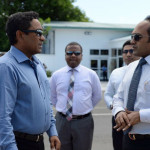The Maldives’ first survey on public attitudes towards democracy reveals a deep crisis of public confidence in key democratic institutions, local advocacy group Transparency Maldives has said.
Of a 1000 randomly selected individuals, 62 percent said they have no confidence in parliament, while 58 percent said they have no confidence in political parties. Respondents who reported no confidence in the local government and courts stand at 50 percent and 46 percent respectively
The ‘Democracy at Crossroads’ survey also revealed extraordinarily high levels of cynicism, with 92 percent stating they believe politicians lie to get elected and 86 percent saying the government does not care about ordinary people.
Cynicism has “corrosive effects on democratic life,” the report said, claiming it drives citizens away from active participation in the public sphere which in turn increases impunity and corruption.
Transparency Maldives’ Advocacy and Communications Manager Aiman Rasheed called on the state to take “extraordinary measures” to regain the trust of the public. Citizens too must step up efforts to hold public officials accountable, he said.
Despite bleak findings, the survey shows citizens are interested in politics and are relatively knowledgeable about politics and active in the life of their communities.
Crisis of confidence
Maldivians gave political leaders a low score with none rating better than average. Former President Mohamed Nasheed received the highest rating at 48 percent while incumbent President Abdulla Yameen received the worst at 26 percent.
Maldives’ 30-year autocratic ruler Maumoon Abdul Gayoom received an average rating of 42 percent while Jumhooree Party leader Gasim Ibrahim received a rating of 41 percent.
The survey also found Maldivians had more confidence in the state’s authoritative institutions than its representative institutions.
Respondents were significantly more likely to report they had more confidence in the army (34 percent) and the police (32 percent) than in political parties (8 percent) or parliament (11 percent).
The report, however, noted “striking” divisions on opinions regarding the security forces.
Although one third of respondents said they have “a great deal of confidence” in the army and police, the same proportions report they have “no confidence at all” in the army (29%) and the police (32%).
Maldivians are troubled by the status quo, the survey found, with 50 percent saying they are dissatisfied with the way democracy works. Meanwhile, 1 in 5 said they were “not at all satisfied” with democracy in the country.
Further, a staggering 84 percent said power is concentrated in the hands of too few people.
The Maldivian public is more likely to have negative associations with the idea of democracy than in other transitional democracies. A majority of respondents linked democracy with instability, poor economy and lack of order.
Meanwhile, 77 percent identified politic issues – which includes conflict, corruption, and the party system – to be the most important problem facing the country. In contrast, only 10 percent said crime was the biggest problem and 8 percent rated the economy and unemployment as the biggest challenge.
However, 90 percent believed dialogue is the way to solve the country’s problems. But 1 in 3 people did believe that violence is sometimes a necessary response to social injustice.
The survey also found that Maldivians scored significantly higher than other populations in their support for the value of individual responsibility at 73 percent. Support for gender equality was much lower at 38 percent, with women more likely to reject gender equality.
Generational differences
The survey results indicated a significant generational gap in attitudes towards democracy, with younger people systematically less likely to be satisfied with democracy than older people. 55 percent of those in the 18-25 age group said they were either dissatisfied or very dissatisfied.
Moreover, a majority of those less than 35 years of age said they have no confidence in representative institutions. Those over 46 years of age are twice as likely as their younger counterparts to say they have high levels of confidence in these institutions.
The young are markedly more cynical, but are more democratic in their outlook. They are more likely to disagree with idea that economies work poorly, less likely to think democracies are unstable and that “there is too much argument” in democracies.
Support for gender equality is significantly higher among the young.
Read the full report here.






Lets hope the sceptical young will eventually pull through (once these ageing, corrupt gits outlive their uselessness) The demographic profile may be our only hope. Guess its impossible to eradicate, drug, radicalize or buy all of this youthful population bulge?? Lets hope the critical mass of youth somehow get some form of sensible education. Lets just hope...against hope! If its meant to get better it will!One step forward, two steps back.. which is where we may be at...its all guesswork right now.
Democracy is a shade of gray.
Every single nation, including the notorious KSA and DPRK, can be spun into one of these gray shades.
Mordis needs a namesake democracy only. Just to appease a certain crowd. What is really wants to be is the cousin of Saudi Kingdom. Unfortunately it is the penniless one.
Commenting by Maldivians on Minivannews shows poor grasp of facts, lack of understanding of issues that are in front of them, and an inability to express themselves with lucidity and decorum.
There is a marked tendency to be rude and abusive,which is a sign that writers have a restricted code in language use.
The greatest living prophet of democracy in the Maldives is not Mohamed Nasheed but Maumoon Abdul Gayoom. The prestige of Gayoom in the country, as a teacher,and role model, is far greater than that of Mohamed Nasheed.
There lies the paradox and dilemma of the democracy that is evolving in the country. On the basis of evidence before me, mainly from Minivannews, I find it difficult to believe that there is enough public support for democracy in the country.
The concept of democracy is too strange, un-Islamic, and too full of pitfalls.
The Maldivian government has always portrayed the country as a tourist paradise and nothing more. The foreigners have mistakenly taken it to mean that the whole country is a paradise, which certainly it is not.
The problem is that Maldivians themselves do not understand their own country because of lack of education, lack of experience of the outside world and prolonged dictatorship in running the country.
Lack of religious freedom combined with Islamic extremism as well as xenophobia keep Maldivians away from modernisation and even democracy itself.
It is nice to live outside my country.
Michael Fahmy -
Gayoom's prestige begins and ends here: http://www.uncuffedmv.com/.
so called europe never got the democracy over night and it took hundreds of years to see the democratic values to take the proper root in those countries.
Until recently , America used black people as their slaves to build the country and its infrastructures . The democracy came after they completed thier infrastructure and their development .
Decmocracy has its own flaws and it is not a perfect solution. But it address most of the issues and have solution but only in paper and not practical.
very good work which you have don i really learned after reading about the confidence before your blog i find it on www.biseweb.com but there is nothing over there
Dear Lord Fahmy, all-knowing speaker of resilient truth.
We Maldivians must worship you and the superior intellect you have gained by living overseas. Breathing fresh air atop the hills, having picnics during Easter, cycling in the countryside with the girls, roast on Sundays and whatever it is that you do to have a rod so far up your own arse.
You can take Fahmy out of Maldives but you can't take the Maldives out of Fahmy - you are a true example of this. You are Maldivian through and through, you just speak English, this is the only difference.
I wonder if Maldivians know what democracy is.
Maldivians don't need to worry about democracy any more. The 3 year experiment didn't work and now it's done, everyone can sleep easy now.
All future elections for parliament/president will just be a dog and pony show anyway. Gayoom and company have to keep the illusion going to ensure financial handouts from the "concerned" Western interests. The infidel imperialists don't really care if Maldives is a democracy or not. They issue statements urging "free and fair elections" to make themselves appear to value democracy. The only thing that really matters is money.
To all the sheep out there... keep your head down, work hard, don't ask questions, and attend all religious services. The world's politicians and religious leaders guarantee you will be rewarded handsomely after your dead.